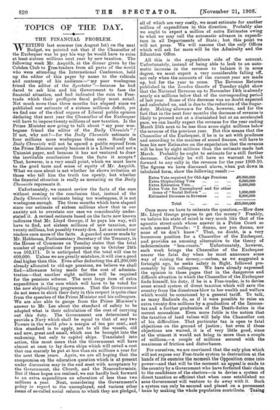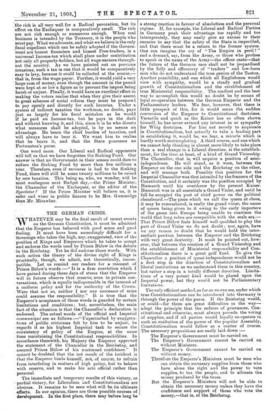TOPICS OF THE DAY.
THE FINANCIAL PROBLEM. w-BITING last summer (on August 1st) on the next Budget, we pointed out that if the Chancellor of the Exchequer was to pay his way he would have to raise at least sixteen millions next year by new taxation. The following week Mr. Asquith, at the dinner given by the Cobden Club to rree:traders from all parts of the wolid who were attending the International Conference, held up the editor of this paper by name to the ridicule and contempt of his audience—" my poor woebegone friend the editor of the Spectalor"—because he had dared to ask him and his Government to face the financial situation, and had indicated the ruin to Free- trade which their profligate fiscal policy must entail. Not much more than three months has elapsed since we published our estimate of a sixteen millions deficit, yet we find one of the chief organs of Liberal public opinion declaring that next year the Chancellor of the Exchequer will have to impose twenty millions of new taxation. Is the Prime Minister now going to talk about "my poor woe- begone friend the editor of the Daily Chronicle" ? If not, why not ?—for the Daily Chronicle estimate is four millions more woebegone than ours. Surely the Daily Chronicle will not be spared a public reproof from the Prime Minister merely because it is a Liberal and not a Unionist paper, and because it has not ventured to draw the inevitable conclusions from the facts it accepts ? That, however, is a very small point, .which we must leave to the good taste and sense of equity of Mr. Asquith. What we care about is not whether he shows irritation at those who tell him the truth too openly, but whether the financial situation is really as menacing as the Daily Chronicle represents it.
Unfortunately, we cannot review the facts of the case without coming to the conclusion that, instead of the Dizily Chronicle's estimate being too woebegone, it is not woebegone enough. The three months which have elapsed since our estimate of sixteen millions show that in our anxiety not to overstate our case we considerably under- stated it. A revised estimate based on the facts now known indicates that Mr. Lloyd George, if he pays his way, will have to find, not sixteen millions of new taxation, nor twenty millions, but possibly twenty-five. Let us remind our readers once more of the facts. A guarded answer made by " Mr. Hobhouse, Parliamentary Secretary of the Treasury, in the House of Commons on Tuesday states that the total number of applications for pensions up to October 24th was 562,171. It is anticipated that the total will rise to 600,000. Unless we are greatly mistaken, it will rise a good deal higher than this. Even after deducting the £1,200,000 already allocated to old-age pensions, we believe we shall find—allowance being made for the cost of adminis- tration—that another eight millions will be required for the pensions scheme. The next large item of extra expenditure is the sum which will have to be voted for the new shipbuilding programme. That the Government do not mean to shirk their duty in this respect is quite clear from the speeches of the Prime Minister and his colleagues. We are also able to gauge front the Prime Minister's answer to Mr. Lee about the standard of safety to be adopted what is their calculation of the cost of carrying out this duty. The Government are determined to provide a Navy which shall be equal to that of any two Powers in the world plus a margin of ten per cent., and this standard is to apply, not to all the vessels, old and new, great and small, which can be brought into the reckoning, but only, to capital ships. Translated into action, this must mean that the Government will have almost at once to lay down ships which will entail a cost that can scarcely be put at less than six millions a year for the next three years. Again, we are all hoping that the compromise on the education question which is at present under discussion may in the end meet with acceptance by the Government, the Church, and the Nonconformists. But if these hopes are realised, we can hardly look forward to an extra expenditure on education of less than two millions a year. Next, considering the Government's policy in regard to the unemployed, and various other items of so-called social reform to which they are pledged, all of which are very costly, we must estimata for another million of expenditure in this direction. Probably also we ought to expect a million of extra Estimates owing to what we may call the automatic advance in expendi- ture in all Departments of State ; but this point we will not press. We will assume that the only Offices which will ask for more will be the Admiralty and the Education Office.
All this is the expenditure side of the account. Unfortunately, instead of being able to look to an auto- matic increase in the revenue to balance it in some degree, we must expect a very considerable falling off, not only when the accounts of the current year are made up, but for the year to come. The Revenue Returns published in the London Gazelle of Tuesday night show that the National Revenue up to November 14th is already nearly six millions below that of the corresponding period of last year. Some of this decrease was no doubt expected and calculated on, and is due to the reduction of the Sugar- duty. Making allowance for this, however, and for the fact that in the next four months the decrease of revenue is likely to proceed not at a diminished but at an accelerated pace, we can hardly expect the revenue for the year ending March 25th next to be less than some eight millions below the revenue of the previous year. But this means that the Chancellor of the Exchequer, if he is to act with prudence and according to the maxims of sound finance, will have to base his new Estimates on the expectation that the revenue will be less by eight millions than the estimate made last March. Probably he ought to estimate for a still further decrease. Certainly he will have no warrant to look forward to any rally in the revenue for the year 1909-10. The figures we have discussed above, when put down in tabulated form, show the following result :— Extra Vote required for Old-Age Pensions £8,000,000
Extra Shipbuilding Vote ... ... 6,000,000 Extra Education Vote... ... 2,000,000 Extra Vote for Unemployed and for other items of "Social Reform" ... 1,000,000 Estimated Decrease in Revenue ... ... 8,000,000 Total '... .625,000,000
Once more we have to reiterate the question,—How does Mr. Lloyd George propose to get the money ? Frankly, we believe his state of mind is very much like that of the agnostic street-arab whose answer in a Police Court so much amused Fronde: "I dunno, nor you duuno, nor none of us don't know." That, no doubt, is a very humorous position for a Chancellor of the Exchequer, and provides an amusing alternative to the theory of indeterminate "hen-roosts." Unfortunately, however, each week brings the Chancellor of the Exchequer nearer the fatal day when he must announce some way of raising the money,—unless' as we suggested a fortnight ago, he seeks safety in flight, followed pre- sumably by his colleagues. We have already expressed the opinion in these pages that in the dangerous and difficult situation in which the Chancellor of the Exchequer finds himself, his duty, if he is a Free-trader, is to devise some sound system of direct taxation which will save the country from the disastrous blow to her wealth and welfare which would be occasioned by a general tariff. To talk, as many Radicals do, as if it were possible to raise an extra twenty-five millions by a graduation of the Income- tax and a further graduation of the Death-duties is the merest moonshine. Even more futile is the notion that the taxation of land values will help the Chancellor out of his difficulties. That particular tax is open to fatal objections on the ground of justice ; but even if. these objections are waived, it is of very little good, since at the utmost it would not bring in more than a couple of millions,—a couple of millions secured with the maximum of friction and disturbance.
For ourselves, we are convinced that the only plan which will not expose our Free-trade system to destruction at the bands of its enemies the moment the Opposition come into power—and that will be the moment an appeal is made to the country by a Government who have forfeited their claim to the confidence of the electors—is to devise a system of direct taxation so efficient that when once established no sane Government will venture to do away with it. Such a system can only be secured and placed on a permanent basis by making the whole population contribute. Taring the rich is all very well for a Radical peroration, but its effect on the Exchequer is comparatively small. The rich are not rich enough or numerous enough. When real :business is intended by the Treasury, it is the people who must pay. What we advocate, and what we believe is the only fiscal expedient which can be safely adopted if the Govern- ment are honest financiers and honest Free-traders, is a universal Income-tax which shall place under contribution not only all property-holders, but all wage-earners through "out the country. As we have pointed out on previous occasions, such a tax is one that it would be comparatively easy to levy, because it could be collected at the source,— that is, from the wage-payer. Further, it would yield a very large sum of money, even though the amount in the pound were kept at so low a figure as to prevent the impost being harsh or unjust. Finally, it would have an excellent effect in making the voters realise that when they give their assent to great schemes of social reform they must be preparel to pay openly and directly for such luxuries. Under a system of indirect taxation the workman, no doubt, pays .just as largely for his fiscal mistakes as he would if he paid an Income-tax, but he pays in the dark and without knowing it, and 1-his, since it is he who directs what measures shall be adopted, is by no means an advantage. He bears the chief burden of taxation, and will always have to bear it. We want him to realise that - he bears it, and that the State possesses no Fortunatus's purse.
• One word more. Our Liberal and Radical opponents , will tell us that we have forgotten the Sinking Fund. Our .answer is that no Government in their senses could dare to reduce the Sinking Fund by more than five millions a war. Therefore, even if recourse is had to the Sinking Fund, there will still be some twenty millions to be raised by new taxation. This being so, who, we wonder, will be most woebegone next Budget day,—the Prime Minister, the Chancellor of the Exchequer, or the editor of the Spectator? If the Prime Minister will believe us, it is safer and wiser in public finance to be Mrs. Gummidge than Mr. Micawber.

































































 Previous page
Previous page